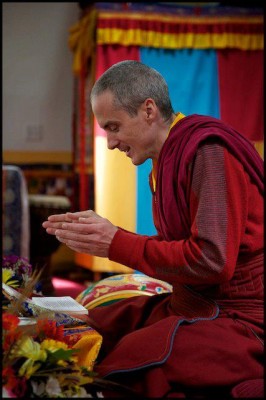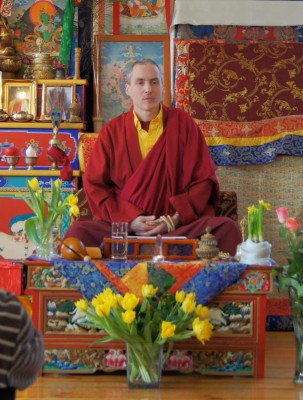I spent much of the past weekend learning more about the root causes of both happiness and suffering, at a Dharma talk about Karma and Happiness, in some sitting meditation sessions, and in a one-on-on private session with a Buddhist monk named Erik Drew Jung from the Dzogchen lineage. 
The main message I took away from the weekend was surprising to me, but a good reminder of something I already knew deep inside: to live your dreams, stop beating yourself up!
Instead, practice loving yourself unconditionally.
Living My Dreams For a Lifetime
I have been so fortunate to live so many of my dreams in this lifetime already, and I am continuously working on achieving new goals and dreams. Right now, completing my book proposal and getting it into the hands of an agent is one big dream.
Expanding my dance performance and teaching career further and using that as a means to empower women to feel sexier in their bodies is another.
Honestly, I was feeling a bit down when I went to see Buddhist Dharma teacher Erik Drew Jung over the weekend, and felt that time with a person whose job is to teach wisdom, compassion and the cessation of suffering would surely help! I’d been noticing lately that some my old self-defeating patterns of criticizing myself and telling myself that I am “not enough” somehow were creeping up on me.
I wanted to shift that, and to step back into my usual state of joy. I’ve gotten pretty used to living with true inner peace over the past several years, and it feels uncomfortable to not feel good!
I went to the Dharma talk looking for that little kernel of wisdom that might shift things for me, and hoping to walk away with some practical strategies to feel more joyful again. And, I was in luck!
Erik talked a lot about how karma originates in our thoughts. Positive thoughts produce positive karma, and negative thoughts produce negative karma. It takes a while for karma to “ripen,” so the more we focus on positive thoughts, the more we are creating a joyful future for ourselves.
Thoughts are powerful! I agree with this, and am thankful for my Buddhist meditation practices which help me to train my mind so that I can focus on more positive thoughts.
And I thought it was very cute that he described himself, in his job as a monk, as a Professional Positive Thinker.
The Fruits of Karma
The idea that our positive or negative thoughts ultimately generate positive or negative karma is a very simple but profound concept. Erik further defined meditation as any thought that we think more than twice, or anything we focus on for an extended period of time.
So if we are “meditating” on joy, or gratitude, we are likely producing happy feelings and empowered actions. If we are “meditating” or dwelling on things that make us unhappy, or on what we think we are lacking in our lives, we are likely to feel down and also are more likely to set in motion “negative karma.”
This makes sense to me because when we feel happy, inspired and empowered, we are often more likely to take positive actions to shape our future. When we are feeling down, we may be more likely to hang out in the status quo, even if it does not feel good to us, rather than risk changing.
The beautiful thing about karma, as Erik defined it, is that simply by focusing on positive thoughts in the now, you can actually stop negative karma from “ripening” sometimes and start creating more good karma.
Really our job is to practice being happy now, and choosing good thoughts, now.

Loving Ourselves, No Matter What!
Later, in one-on-one sessions, Erik and I talked about what was bothering me, and how I could move forward with my practices. I wanted to know what I could do to deepen in my commitment to Buddhism, and how to further “free” myself from the suffering that I create. for myself when I’m hanging out with my negative thoughts.
I didn’t really expect him to zero in so clearly on one specific thing that needed shifting. But the more we talked, and the more questions he asked, the more one clear obstacle to my happiness emerged.
Basically, he figured out that I have not yet fully kicked the habit of beating myself up! Over the years, I have actually made great progress in this arena, finding countless ways to practice loving myself and my body as it is; finally considering myself to be “beautiful” in my 30s after not finding myself so in my teens and 20s (no matter what anybody else said!); acknowledging my accomplishments and taking bold steps toward my dreams.
But it was clear to both of us that the old, engrained habit of criticizing myself for not doing enough, being enough, or for having made some mistake in the past was still there. And Erik said it needs to shift. Now!
Basically, we both agreed that I was not allowed to beat myself up anymore, period. Learning from your mistakes and applying the newfound wisdom is one thing, and that is a good thing.
Beating yourself up for having made mistakes at all is not particularly helpful, since we are all human and are all going to continue to make mistakes on this human journey.
Focusing instead on what you are doing well is much more productive.
Of course it’s good to learn from our mistakes. It’s just not helpful to berate ourselves for having made them! That’s just “anger directed inward,” as they call it in this lineage of Buddhism.
Standing in Loving Compassion
To truly practice loving kindness towards all beings, we really do need to start with ourselves.
Erik gave me the wonderful exercise of starting a journal specifically dedicated to writing down things I have done that have been beneficial to myself and others. There are more specific and details instructions to follow that we talked about for quite a while, but the basic idea is to record good deeds we do and to review them periodically.
It’s a way to remind ourselves that we are loving beings, doing our best in the world. And it’s a reminder that if we have accomplished these good things in the past, we can certainly do a lot more in the future to benefit ourselves and others.
It’s a way of practicing faith, and of cultivating more self-confidence. And faith and self-confidence are both important ingredients in making our dreams come true.
If you find yourself beating yourself up sometimes, try to catch yourself in the act. See if you can replace the thought with a more loving and kind thought.
Jack Canfield has a great exercise in his book The Success Principles in which he asks you to journal first in the “self-critical” voice that we all have sometimes. He calls it the “judging” voice.
Then he has you write down what you are afraid of, in a loving way. Maybe you are berating yourself for not paying off your credit card debt yet, and the real fear is being in debt forever, or that you’ll always feel stressed about money.
Then he asks you to come up with very specific action steps you can take to shift the situation in a more positive direction. Finally, he has you write down – in the voice of “love” – the reasons why it’s important to make the shift.
He gives the example of a parent who yells at a child who dashes across the street. The child may hear judgment or fear in the parent’s voice, but the root of it all is love: the parent loves this child and wants him or her to live a long, happy healthy life.
When we judge ourselves or find ourselves in fear, it can be helpful to remember that the root is love – we, too, want ourselves to live a long, happy, healthy life, and may fear not making that happen! It’s helpful to write down specific action steps we can take to shift a situation as well.
Taking action and focusing on the solution, rather than the problem, almost always creates a positive shift.
And this lovely exercise turns the critical inner dialogue around and brings it back to a loving place.
Practice Loving Yourself!
As you take steps towards living your dreams, and as you navigate your daily life, don’t forget to be as kind to yourself as you are to others. We all need loving kindness from ourselves.
Practice loving compassion towards yourself, practice thinking positive thoughts, and watch your dreams start to take off!
Lisa

Lisa P. Graham is an inspirational writer, life coach, TED motivational speaker, and globe-trotter whose passion is to help others to find happiness and meaning in their daily lives. A political activist at heart, Lisa would like to empower more women to run for political office as a way to create positive change in the world. You can find her on her website or watch her TEDx speech on YouTube.
Note: Articles by Lisa may contain affiliate links and may be compensated if you make a purchase after clicking on an affiliate link.




